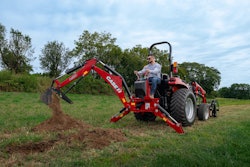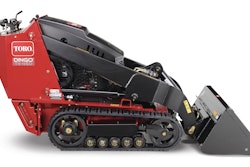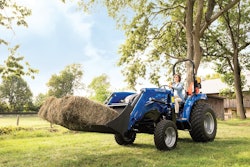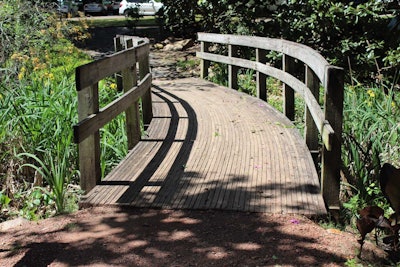 Photo: Beth Hyatt
Photo: Beth HyattThis is part three in a three-part series. Click here to read parts one and two.
Boosting interest in the green industry
The problem
Green industry professionals have said it time and time again, but one of the main challenges they face in this line of work is the stereotypical idea that landscaping only means mowing lawns.
While this element is crucial to this line of work, it is only one portion of a much larger scale. This stereotype, unfortunately, can sometimes be a contributing factor to the low student interest in the fields of horticulture, landscaping, landscape design, landscape architecture and more.
With this in mind, professors and members of Facilities Management at Auburn University sat down to discuss the day-to-day operations of their departments, how they work together, why their fields are important and what can be done to spread more awareness of the green industry.
The solution
Working together
Like a well-oiled machine, green industry departments across the campus come together to foster growth among those entering the field.
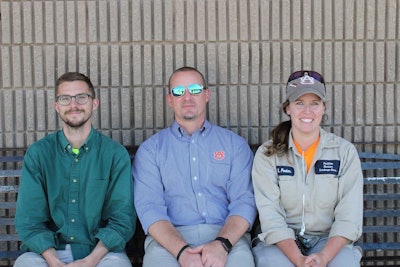 Pictured, from left to right, are Alex Hedgepath, the university’s first arborist; Justin Sutton, superintendent of Facilities Management Landscape Services; and Brittany (Britt) Foster, greenhouse coordinator.
Pictured, from left to right, are Alex Hedgepath, the university’s first arborist; Justin Sutton, superintendent of Facilities Management Landscape Services; and Brittany (Britt) Foster, greenhouse coordinator.Photo: Beth Hyatt
From Facilities Management to horticulture to landscape architecture, these professors and professionals work side by side to teach students the value of working in the green industry, how to get involved and the impact they can make once involved.
Whether it’s collaborating on projects, offering advice on a particular situation or creating new ideas to benefit the university as a whole, representatives from Auburn’s horticulture, landscape architecture and Facilities departments rely on each other’s skills and expertise to develop and expand the presence of the green industry across campus.
Judd Langham, campus planner and landscape architect with the Office of the University Architect (OUA) in Facilities Management, knows firsthand the importance of these departments intermingling, as he himself completed the university’s horticulture and masters of landscape architecture programs. He now uses these degrees to help with Auburn’s campus master planning efforts to provide guidance for the university’s everyday operations.
Langham says his department, Campus Planning, develops and enforces policies and standards for the entire campus, as well as prepares necessary updates that will be addressed during the university’s master plan revision process.
“We put a lot of focus and emphasis on the character and image of our landscape throughout the entire university campus,” Langham said. “And we have allowed the landscape master plan to set priorities and different criteria that showcases (the campus). So, we have determined a hierarchy of spaces that helps us prioritize how much money and attention we put into a specific area on campus.”
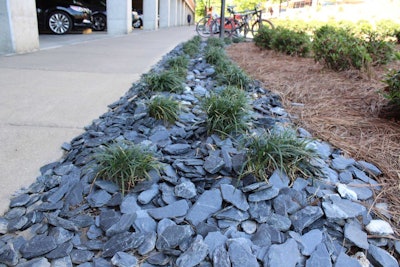 Photo: Beth Hyatt
Photo: Beth HyattLangham says his position primarily consists of design review, project management, in-house designing and space management, which requires him to have a basic understanding of the campus in its entirety, both interior and exterior.
Joe Eakes, a professor in the department of horticulture, says the horticulture department has four tracks: landscape, production (greenhouse and nursery), fruit and vegetable and pre-landscape architecture. Eakes is most heavily involved in the landscape track and says students pursuing a degree in horticulture are able to gain hands-on experience by working around campus.
Charlene LeBleu, a professor of landscape architecture, says that the campus also allows students in this department to use certain areas as teaching, competition and design palettes.
LeBleu notes that Auburn’s Samford Park was recently chosen as a Landscape Architecture Foundation (LAF) case study for landscape performance. LeBleu says the landscape performance series is a national online case study system, and up until this year, Alabama had no case studies like these.
Ray Willett, supervisor with Facilities Management, specializes in campus irrigation and oversees pesticide application. Willett says the training other departments perform with staff members ultimately aids in the overall collaboration that takes place between his crews and the rest of Facilities Management.
Spreading the word
When it comes to spreading the word about the green industry and what it can offer, most professionals will agree that a proactive approach is the most beneficial plan.
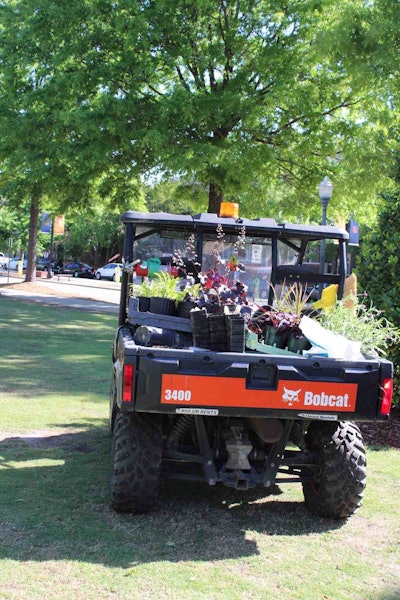 Photo: Beth Hyatt
Photo: Beth HyattWhether it’s by talking to the community about what landscaping really is or creating elective classes in middle and high schools dedicated to horticulture and more, the general consensus is that something more needs to be done to inform incoming students.
Theoretically, the sooner students understand the green industry and what it offers in the way of a career and versatility, the more likely it is that interested students will go directly into that degree field once they enter college.
Being in the department of horticulture, Eakes believes that the fact that younger students aren’t exposed to the green industry earlier on could potentially prove detrimental to the industry’s future.
Over the years, Eakes has done research with the National Collegiate Landscape Competition (NCLC) and found that many students were introduced to horticulture either through a family member or through a summer job, but it wasn’t until they got to college that they really had an understanding of what opportunities are in the green industry.
“A lot of our students really don’t get into our program until about their junior year of college,” Eakes said. “That’s a real problem for us. We don’t have a big influx of freshmen every year. We typically get them as transfer students, not just from a junior college but from here on campus.”
Eakes agrees that there is a misconception when it comes to defining the green industry and many students aren’t aware of the variety and options that come with it. But the misconception doesn’t stop with the students.
“One of the big concerns is that many times parents want something ‘far more’ for their children,” Eakes said. “Even though they may be terribly unhappy being a doctor, lawyer or whatever it might be.”
With the goal of gaining more interest in the field, Eakes says the horticulture department began reaching out with elective classes to introduce students to the green industry and gauge their interest.
“Working with the industry, one of the biggest things is for students to understand this is a professional career,” Eakes said. “It’s not just a technical career. We do some technical things, but it’s a professional career if you really apply yourself and want to do the types of jobs.”
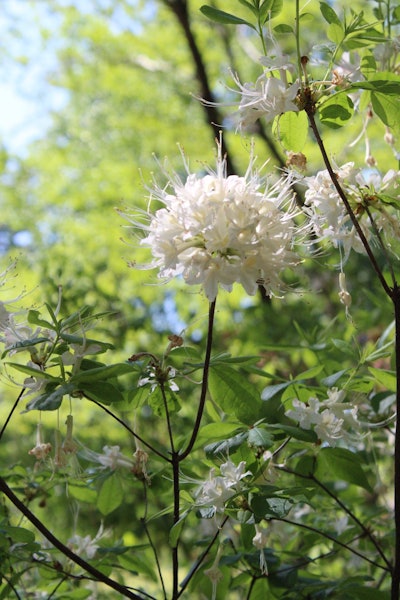 Photo: Beth Hyatt
Photo: Beth HyattLeBleu agrees that this seems to be the case in the landscape architecture field as well. Most of the participants in her program are split evenly between those who knew they wanted to be a landscape architect and those who didn’t know it was a degree until they were well into college.
LeBleu recommends bridging this noticeable gap by student groups on campus holding workshops or meetings with younger students to grow, foster and pursue these green interests.
Speaking from his personal experience, Justin Sutton, superintendent of Facilities Management Landscape Services, says he was familiar with landscaping in high school because of his summer job, but it wasn’t until he got to Auburn that he found out it could turn into a professional career.
With the current generation making its way into the working world, Sutton believes more trade jobs will become popular, as well as work in the green industry.
Another aspect of this industry that many professional landscapers have tried to drive home is the fact that a four-year degree is also not necessary to be successful in the field of landscaping.
“With hiring someone, a degree is important, but I would hire someone that had 10-15 years of experience over someone with a four-year degree,” Sutton said. “Experience is very key, and it’s a give and take. And someone with a degree and experience is going to trump someone with just experience.”
Willett also notes that the transfer students coming in from other degree programs may not know as much about the plant and horticulture aspect of the field, but they may have an abundance of experience on the managerial side.
“A lot of these people that have experience with working with other employees or managing employees that are managing a project are successful on our side,” Willett said. “They may not know the plants and may not know the technical side of it, but they know how to physically get it done. It’s all about employee management and project management, and that’s what drives the success. The people we see that come in our business that don’t have degrees usually excel in those two areas.”
Setting yourself apart
As a young professional about to head out into the world, it’s important to be on top of graduation, internships, job applications, interviews and more, but what are some of the extra things that can be done while still in school that will set you apart from the crowd?
 Photo: Beth Hyatt
Photo: Beth HyattLeBleu says an important aspect of preparing for the transition into the real world is an obvious but crucial one: have a portfolio and resume ready the fall before graduation or earlier.
For Langham, he says the emphasis he put on participating in competitions while in school helped him, along with getting involved with professional organizations. Taking these seemingly small steps allows students to make professional contacts and network early on, which can ultimately lead to internships or job offers.
Eakes encourages students to be active in joining and participating in clubs, to go on trips to expos and competitions and learn what it means to dress for success and interact with industry professionals.
“A lot of students go to these things and think, ‘I’m just a student,’ and I think they are selling themselves short,” Eakes said. “And in some cases, they are injuring themselves because they think nobody is watching, but they are.”
He also stressed the importance of taking the opportunity to study abroad to learn about different landscaping techniques and the international horticulture industry when possible. Having knowledge of how other areas of the world perform green industry tasks and handle day-to-day issues can impress potential employers while also creating a well-rounded individual, according to Eakes.
Sutton emphasized the importance of internships within your field of study. Whether an internship with a certain company leads to a job offer or not, he notes that the experience and networking possibilities can pay dividends later on.
As Sutton can personally attest to, working in your field of study while in school can sometimes turn into a career opportunity after graduation, whether it’s immediate or later on. As someone who was involved with on-campus work in the green industry, Sutton has now used that experience to find out exactly what he wants to do and where he wants to be.
“I love Auburn and the outdoors,” Sutton said. “I have a job where I get to do what I love at the place I love. It doesn’t get any better than that.”
 Photo: Beth Hyatt
Photo: Beth Hyatt







